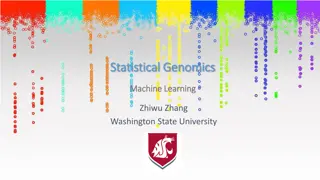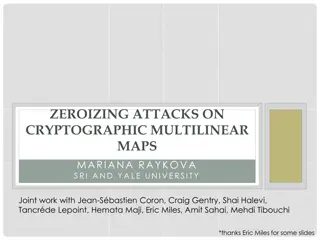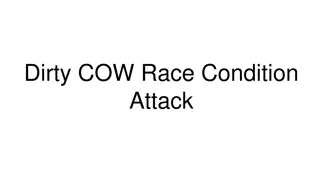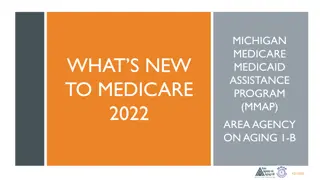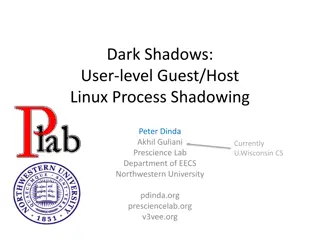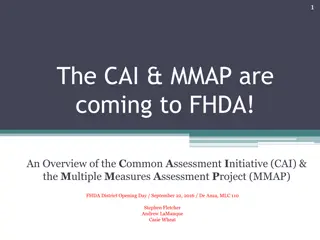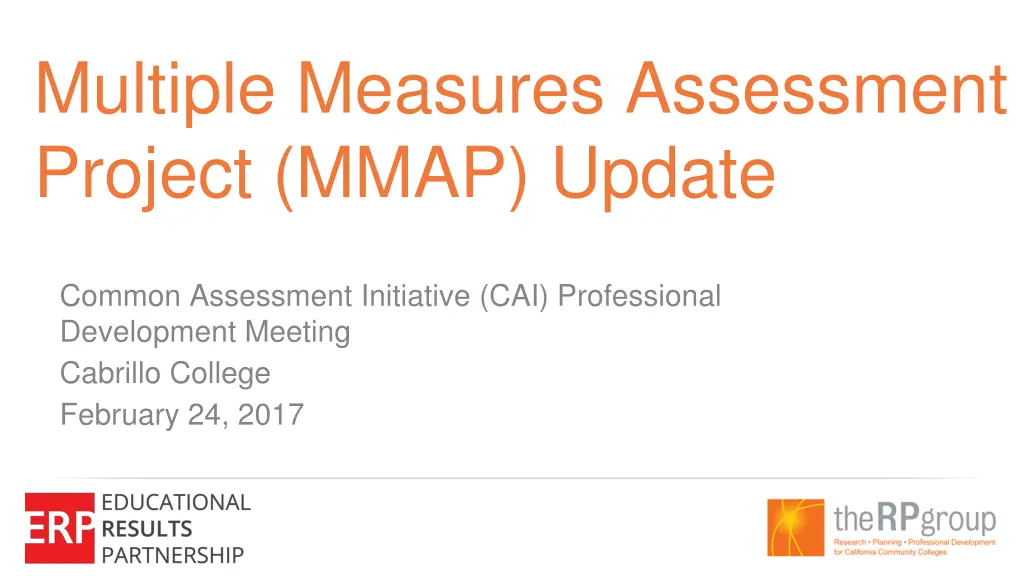
Assessment Project Update and Data Exploration
Explore the Multiple Measures Assessment Project (MMAP) Update at Cabrillo College, focusing on Common Assessment Initiative (CAI) and professional development. This project delves into English, Math, ESL, and non-cognitive variables, utilizing self-reported transcript data for analysis. Discover the models, datasets, variables explored, and rule sets for transfer-level and one-level-below courses for CCC students. Dive into the engagement and collaboration model development for statewide implementation.
Download Presentation

Please find below an Image/Link to download the presentation.
The content on the website is provided AS IS for your information and personal use only. It may not be sold, licensed, or shared on other websites without obtaining consent from the author. If you encounter any issues during the download, it is possible that the publisher has removed the file from their server.
You are allowed to download the files provided on this website for personal or commercial use, subject to the condition that they are used lawfully. All files are the property of their respective owners.
The content on the website is provided AS IS for your information and personal use only. It may not be sold, licensed, or shared on other websites without obtaining consent from the author.
E N D
Presentation Transcript
Multiple Measures Assessment Project (MMAP) Update Common Assessment Initiative (CAI) Professional Development Meeting Cabrillo College February 24, 2017
Project Overview CAI English Math ESL Reading Non-cognitive Variables Self-reported transcript data Local replication Webinars Professional development Support Pilot results inform statewide implementation Engagement Collaboration Model Development CCCCO Cal-PASS+ RP Group 63 CCCs
Data Set for Models CCC students enrolled in an English, Math, Reading or ESL class with matching high school data in CalPASS ~1 M cases for Math & English; ~200k for Reading & ESL Bulk of first CCC enrollments from 2008 through 2014 Rules were developed with the subset of students who had four years of high school data (about 25% of total sample) Used rpart to create the trees uses a machine learning algorithm where the order of entry of the variables does not matter. All predictors are considered in the algorithm, the predictor with the greatest gain to the model is selected for the first branch of the tree, continues to split until the splits no longer improve the model.
Variables Explored High School Unweighted Cumulative GPA Grades in high school courses CST scores Advanced Placement course taking Taking higher level courses (math) Delay between HS and CCC (math) HS English types (expository, remedial, ESL) HS Math level (Elem Algebra, Integrated Algebra, Pre-Calculus)
Transfer-Level Rule Sets Transfer Level Course College Algebra (STEM) Passed Algebra II (or better) N=216,420 Direct Matriculant HS 11 GPA >=3.2 OR Non-Direct Matriculant HS 12 GPA >=3.2 OR HS 11 GPA >=2.9 AND Pre- Calculus C (or better) HS 12 GPA >=3.0 AND Pre-Calculus or Statistics (C or better) Statistics (General Education/Liberal Arts) Passed Algebra I (or better) N=216,420 HS 11 GPA >=3.0 OR HS 12 GPA >=3.0 OR HS 11 GPA >=2.3 AND Pre- Calculus C (or better) HS 12 GPA >=2.6 AND Pre-Calculus (C or better) English N=347,332 HS 11 GPA >=2.6 HS 12 GPA >=2.6 All rule sets: http://rpgroup.org/All-Projects/ctl/ArticleView/mid/1686/articleId/118/Multiple- Measures-Assessment-Project-MMAP
One-Level Below Rule Sets One Level Below Course Direct Matriculant Non-Direct Matriculant HS 12 GPA >=2.4 AND 12thGrade English C (or better) Reading HS 11 GPA >=2.2 HS 12 GPA >= 2.4 AND CST English >= 322 HS 12 Grade GPA >=1.7 AND 12th Grade English C+ (or better) ESL HS 11 GPA >=2.7 HS 12 GPA >=2.6 The vast majority of ELL/ELD HS students (~85%) who enter CC begin directly in mainstream English coursework. Other major populations of ESL students (e.g., international students, migrants, older immigrants) will not have US high school transcripts and so other multiple measures, such as essays, must be used with those groups.
Spring/Fall 2016: Mira Costa College Rule Set: 3.0 or above OR 2.5 GPA plus a B in English course, all self-reported.
Mira Costa transfer-level English success rate by year/placement type n=1094 n=179 n=498 n=1150
Las Positas preliminary F2016 results: English Rule Set: 2.5 GPA or higher; self-reported data; N = 348
Fall 2016: Norco College Statewide rule set: English = 196; Math = 205
Fall 2015: Caada College Rule set: English = 2.3 AND B- or better; Math = 3.2 AND C or better bit.ly/MMAPPilotLessons
Spring 2015: Shasta College Percentage of Students Placed in English Courses by Course Level within Student Group 86.83% 90% 80% 66.44% 70% 60% 55.48% 50% 40% 27.92% 30% 20.10% 20% 10.22% 8.73% 8.61% 7.87% 10% 4.64% 1.88% 1.08% 0% Transfer Level One Level Below Two Levels Below Three Levels Below Traditionally Assessed All Others Multiple Measures Cohort Rule set: GPA 2.7 AND B or better in last English course; 471 students in cohort
Spring 2015: Shasta College No significant difference in success rates among the three student groups Multiple Traditionally Assessed 64.44% All Success Rate Average (all courses) Measures Cohort 66.81% Others 64.71% Total 65.04% 67.17% 67.51% 70.67% 68.66% Transfer level 64.52% 60.44% 55.11% 58.35% Below transfer Multiple Measures Cohort (93.01%) significantly more likely to be retained in English courses (overall) than Traditionally Assessed (84.49%) group Neither group differed from All Others group (89.54%) Retention Rate Multiple Traditionally Assessed 84.49% All Measures Cohort 93.01% Others 89.54% Total 88.35% Average (all courses) 92.93% 83.97% 91.52% 89.42% Transfer level 93.55% 85.16% 86.36% 86.38% Below transfer
Summary from Pilot College Analysis MMAP rules performing as expected Messaging around the use of multiple measures should be done in a single voice and specifically state which course they should enroll in - Placing via a test and then trying to overwrite that placement with later messages leads to a sharp reduction in use of the enhanced placement Implementation of MM rules is nuanced, requiring careful compliance with details MMAP started conversations within departments that did not exist prior Collaboration between high schools and colleges has increased and is an important element of success
Self-Reported Transcript Data and Non-Cognitive Variables
Self-reported high school transcript data 69 community colleges are now collecting self-reported data through the Open CCCApply application this includes a mix of pilot and non-pilot colleges The team is currently trying to get access to these data to analyze the validity of self-reported data. however preliminary data from the pilot colleges shows reliability between self-reported transcript data and actual transcripts
Social-psychological (non cognitive variables) data 14 pilot colleges have reported they are in the process of collecting Social-psychological (noncognitive variables) data the team is currently following up to try to get access to these data these include: Grit, Hope, Mindset, Conscientiousness, Teamwork Scale, Academic Self-Efficacy Scale, College Identity Scale Preliminary results from a few colleges have not shown strong relationships between the measured variables and course outcomes, but this could be due to many factors: small sample sizes limited data to be able to control for prior achievement
Integration of MMAP with CAI Common Assessment platform will house a transcript data repository repository will be source-agnostic & store transcript data from variety of sources, including CalPASS & self-report via CCC Apply statewide decision trees programmed into platform, for internally generated Multiple Measures placement recommendation expect data points used in MM placement recommendation Students will receive single placement recommendation created from disjunctive placement model Platform users with the Counselor role will have access to all placement recommendations for a student
Subsequent integration with CAI Initial integration will not allow local customization. Future phases will support Conjunctive and Compensatory methods Guidance, limits, and thresholds for local customization will be provided as phased releases progress Functionality for additional local multiple measures not yet determined. Will rely on feedback and direction from field (e.g., the MMAP project and all of you) Timeline for subsequent phases to be determined in forthcoming road mapping exercise.
But, what about grade inflation? Evidence for grade inflation low at best Little evidence for grade inflation over last decade Earlier observations of grade inflation may have been partly artifactual adjustments to GPA for AP/IB/Honors Zhang & Sanchez, 2014: http://bit.ly/ACTGradeInflation Most importantly not consistent with the data
How Long are Transcripts Good for? Correlation between Predictor and 1st CC English Grade Semesters of Delay (approx. 6 months each)
Concern: High school GPA is only good for recent graduates Correlation between Predictor and 1st CC Math Grade Semesters of Delay (approx. 6 months each)
Upcoming MMAP Events Returning Your Pilot College Data: Thursday, March 9 - 12:00 p.m. - 1:00 p.m. This webinar is for colleges who have already implemented the statewide multiple measures models and have completed a full term with students placed using the models. We are requesting all colleges share their assessment data with the MMAP Research Team for inclusion in the statewide analysis of the models. This webinar will walk colleges through the process for extracting the data elements locally and how to submit the data to Cal-Pass Plus. MMAP: Implementation for New Pilot Colleges: Tuesday, March 14 - 10:00 a.m. - 11:00 p.m. This webinar is for new pilot colleges who have not yet placed a cohort using the models. The MMAP Team will walk you through the steps from start to finish. MMAP: Developing a Research Plan: Wednesday, March 29 - 1:00 p.m. - 2:00 p.m. This webinar is for colleges who would like assistance developing a comprehensive research plan to track the impact of the statewide models on student placement, success, and sequence completion.
MMAP Research Team John Hetts Educational Results Partnership jhetts@edresults.org Loris Fagioli The RP Group lfagioli@ivc.edu Rachel Baker UC Irvine rachelbb@uci.edu Ken Sorey Educational Results Partnership ken@edresults.org Mallory Newell The RP Group newellmallory@deanza.edu Nathan Pellegrin The RP Group nathan.pellegrin@gmail.com Terrence Willett The RP Group twillett@rpgroup.org Daniel Lamoree Educational Results Partnership dlamoree@edresults.org Craig Hayward The RP Group chayward@rpgroup.org Peter Bahr University of Michigan prbahr@umich.edu

